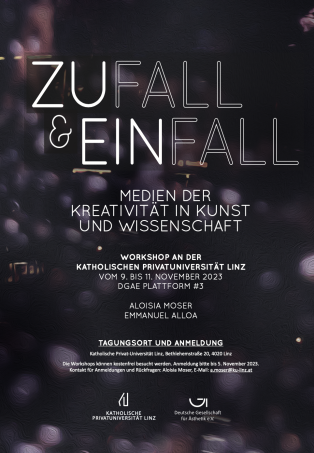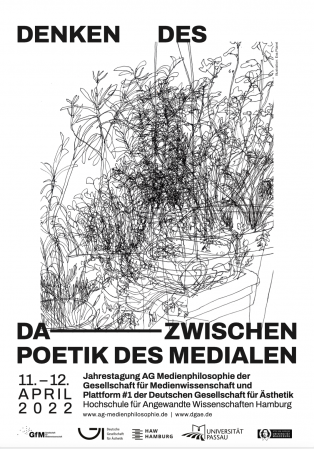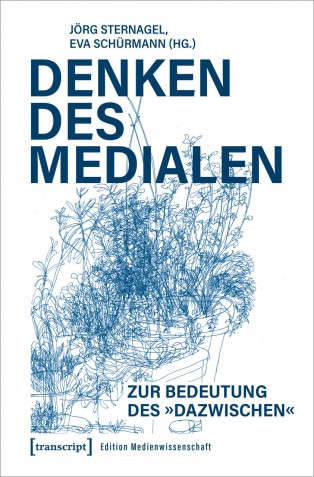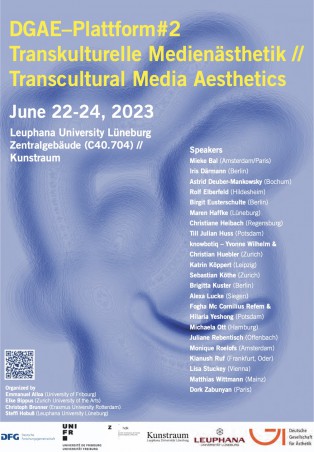Zufall und Einfall
DGAE Platform #3:
Chance and Invention: Media of Creativity in Art and Science
Workshop, Catholic Private University Linz, November 9-11, 2023
The workshop is organized by Aloisia Moser in cooperation with the Faculty of Philosophy and Art History at the KU Linz and under the patronage of the German Society for Aesthetics and is primarily aimed at young female researchers.
Keynote speeches: Lidia Gasperoni, Sibylle Krämer, Alva Noe, Hans-Jörg Rheinberger, Monika Wagner
HOW DOES ANYTHING NEW EVEN COME INTO FORM?
In answering this question, art and science have often been assigned diametrically opposed positions: Scientific innovation was mostly viewed as the result of targeted, planned research, whereas artistic innovation was seen as the fruit of a genius’s inspiration. A look at scientific and artistic practices reveals how wrong both ideas are. Just as aesthetic form cannot arise from nothing, scientific facts cannot be achieved through deductive processes alone. Rather, an experimental field stretches between art and science, in which the aleatoric, serendipity, and even material factors play a far greater role than previously thought. This workshop explores the role of media triggers in the creation of scientific and aesthetic facts. Media triggers refer to both the ordering of the material that sometimes arises randomly in the search process, whose specific arrangements suggest new solutions to problems, but also the medial events between active and passive, which allow the searchers to come up with something that was previously unimaginable.
The fact that experimentation with processes is so important in both art and science suggests that in both areas the desired result often only occurs indirectly and unintentionally. Successful works of art cannot be forced, just as insights cannot be forced: at best, the framework can be created to increase the probability of their occurrence. Every creative innovation presupposes the ability to see things in a new and different way than before, but that is easier said than done, since it is often precisely the active search that prevents ideas from becoming apparent. This workshop explores the relationship between searching and finding in creative processes, between linearity and disruption, purpose and lack of intention, but also the extent to which the (aesthetic and scientific) spirit is not already inherent in physical and material arrangements. To what extent are conceptual syntheses merely spelling out previous non-conceptual syntheses in the material? How many ideas are in fact subject to chance? What emerges from the synthesis of aleatorically generated elements? To what extent can we claim our ideas as our own, and to what extent are they merely something that happens to us or even comes upon us? Between active and passive, spirit and matter, explicit and implicit knowledge, the workshop aims to pay attention to those media triggers without which the radical changes in our artistic and scientific exploration of the world would not have occurred.
program
November 9
1:30 to 2:00 pm: Opening greetings by Aloisia Moser
Panel I Falling playfully…playing with a sense of anticipation
14:00 to 18:55: Moderation Sibylle Trawöger
2:00 PM to 3:30 PM: Keynote Lecture 1, Sybille Krämer: „The Playfulness, the Combinatorial, and the Creativity of the ‚Cultural Technique of Flattening'“
3:45 PM to 4:45 PM: Sebastian Lederle: „Precarity as a Reflex and Reflection of Contingency. A Media-Aesthetic Perspective on the Manufactured Unpredictability of Experience.“
16:50 to 17:50: Marie von Heyl: “Eupalinos or the Discarded Object — Sublimation as a Tipping Point between Chance and Invention in Paul Valéry and Gilles Deleuze”
17:55 to 18:55: Emanuel Seitz, „Sense of Intuition. How Intuitions Predict“
November 10
9:30 to 10:00: Coffee welcome
Panel II Experimenting Carefully and Randomly I: Medial Flashing and Capturing
10:00 am to 12:30 pm: Moderator Aloisia Moser
Keynote lecture 2, Lidia Gasperoni: „Media of Effects. On the Performativity of Experimentation“ has unfortunately been canceled due to a job interview
10:00 to 11:00: Dennis Jelonnek: „The ‚Skogsnuvism‘ and its consequences – on the use of chance in the work of August Strindberg“
11:15 to 12:15: Lotte Warnsholdt: „‚Nobody is my name.‘ „Stories from the Archive of Worry“
12:30 to 14:00: Lunch Bistro Frédéric (Kunstuni am Hauptplatz 6)
Panel III How material constellations fall into place
2:00 pm to 7:30 pm: Moderation Monika Leisch-Kiesl
2:00 to 3:30 PM: Keynote Lecture 3, Monika Wagner: „Spatula, Broom, Fire. Random Generators in Modern Art“
15:45 to 16:30: Vernissage Beate Gatchelhofer “The Appropriation of Chance”
4:35 pm to 5:35 pm: Anja Kraus/Mariana Vassileva: “Landscaping as an Artistic Strategy”
6:00 pm to 7:30 pm: Moderation by Aloisia Moser
6:00 pm to 7:30 pm: Keynote lecture 4, Alva Noë: “The aesthetic predicament”
Dinner at the Promenadenhof (Promenade 39)
November 11
9:00 to 9:25: Coffee welcome
Panel IV Careful and Random Experimentation II: What Noises and What Flashes
9.25 to 11.30: Presented by Sarah Kolb
9:25 to 10:25: Hanako Geierhos: “encounter of randomness”
10:30 to 11:30: Ania Mauruschat: „Radiophony, Disturbance, and Cognition. On the Epistemology of Radio Art in the Disaster Radio Plays of Andreas Ammer and FM Unit“
Keynote lecture 5, Hans-Jörg Rheinberger: “Serendipity – Research and Discovery” unfortunately has to be canceled due to illness.
11:30 to 12:00: Farewell
DGAE Platform #1:
Thinking of the in-between, poetics of the media
Annual Conference of the Media Philosophy Working Group of the Society for Media Studies and Platform #1 of the German Society for Aesthetics at the Hamburg University of Applied Sciences
April 11–12, 2022
Day #1
9:30–10:00 am: Welcome and introduction: Jörg Sternagel (University of Passau) and Eva Schürmann (University of Magdeburg), Alice Lagaay and Anke Haarmann (HAW Hamburg): „The path in between“
10:00–10:45 am: Opening lecture: Volkmar Mühleis (LUCA School of Arts, Brussels): „After the Image – About the Laughing Stock Research Project“ | Moderation: Eva Schürmann (University of Magdeburg)
10:45-11:00: Break__Interval
11:00–11:45 am: Vanessa Ossino (University of Cologne) “Expression as Opening to the World” | Moderation: Jörg Sternagel (University of Passau)
11:45 – 12:00: Break__Interval
12:00–12:45 pm: Christoph Hinkel (Upper Franconia District Health Facilities, Bayreuth District Hospital): „Becoming with me, you speak with my voice – Media-philosophical and aesthetic aspects of art therapy discussions“ | Moderation: Tom Bieling (HAW Hamburg)
12:45–14:00: Lunch break
2:00–2:45 pm: Anne Gräfe (Academy of Fine Arts Munich): „Exercise in Thinking – The Moment of In-Between in Manon de Boer’s An Experiment in Leisure“ | Moderation: Jörg Sternagel (University of Passau)
2:45-3:00 pm: Break__Intermediate space
3:00–3:45 pm: Johann Szews (University of Hildesheim): „Politics in the Intermediate Space. On the Mediality of Democratic Practice“ | Moderation: Frieder Bohaumilitsky (HAW Hamburg)
3:45-4:00 pm: Break__Intermediate space
4:00–4:45 pm: Christian Krüger (Free University of Berlin): “Algorithmic Imagination – On the Media-Technological Transformation of Human Perception” | Moderation: Torben Körschkes (HAW Hamburg)
4:45-5:00 pm: Break__Intermediate space
5:00–5:45 pm: Jurga Imbrasaite (Leuphana University Lüneburg): „Between Public and Private: Scope for Action of a TikTok Generation“ | Moderation: Anke Haarmann (HAW Hamburg)
5:45-6:00 pm: Break__Intermediate space
6:00–6:45 pm: Evening lecture: Aloisia Moser (Catholic Private University of Linz): „Two Paths of the In-Between: Imagination and Educative Power“ | Moderation: Petja Ivanova (HAW Hamburg)
from 6.45 pm: Dinner
Day #2
9:30–10:15 am: Literary Forum: Veronika Reichl (Berlin): “The Feeling of Thinking – Narratives about Reading Theory” | Moderation: Michaela Diener (HAW Hamburg)
10:15-10:30: Break__Intermediate space
10:30–11:15 am: Alisa Kronberger (Philipps University of Marburg): „On a Visual Way of Knowing – a Flashing In-Between. An Encounter between Walter Benjamin and Karen Barad“ | Moderation: Alice Lagaay (HAW Hamburg)
11:15-11:30: Break__Intermediate space
11:30–12:15: Nicolas Oxen (Düsseldorf Art Academy): „Life is in the transitions as much as in the terms connected. James, Woolf, Faulkner“ | Moderation: Alice Lagaay (Hamburg University of Applied Sciences)
12.15–13.30: Lunch break
1:30–2:15 pm: Thomas Schlereth (State Academy of Fine Arts Karlsruhe): “Restraint as a Gain of Space – Sextus Empiricus and Skeptical Positions in Recent Art Theory” | Moderation: Anke Haarmann (HAW Hamburg)
2:15-2:30 pm: Break__Intermediate space
2:30–3:15 pm: Irene Breuer (University of Wuppertal): “Derrida on Husserl: The Hiatus between Logical Identity and the Indeterminacy of Experience – Is Architectural Expression” | Moderation: Eva Schürmann (University of Magdeburg)
3:15-3:30 pm: Break__Intermediate space
3:30–4:15 pm: Closing discussion The conference takes place in cooperation with the Theory Department at the Hamburg University of Applied Sciences.
Hamburg University of Applied Sciences
Department of Design
Armgartstrasse 24 | Auditorium, 22087 Hamburg
Participation in the conference is only possible with proof of 2G Plus. Registration for participation is requested by April 1, 2022, by email to: joerg.sternagel@nulluni-passau.de
New release
Thinking of the In-Between. On the Meaning of the „In-Between“
Jörg Sternagel, Eva Schürmann (eds.)
Bielefeld: transcript 2024
Call for Papers
to (post-)doctoral researchers working on the following topics:
» Thinking of the In-Between , Poetics of the Medial«
Annual Conference of the Media Philosophy Group at the Hamburg University of Applied Sciences, April 11-12, 2022
www.ag-medienphilosophie.de
As a middle and mediating force, media exists in an intermediate realm that is systematically suited to escaping false oppositions: Instead of dichotomies such as human and machine, subject and object, or fiction and truth, a tense both/and can emerge, which, however, can sometimes only be described as neither/nor. If we think of the middle not only spatially but also temporally—namely as a path and movement of mediation—further qualities of the media come into view. How and through what a poetics of the media can unfold along this path and in the course of this movement will be the subject of a two-day conference.
The focus should not be on action or knowledge, but on the path between them. In doing so, we place common conceptual distinctions from a media-philosophical perspective in a field of tension between intentionality and performativity, alterity and identity, action and event.
We will attempt to keep the once-distinguished and separated poles in view from a greater distance and illuminate the manifestations and means of formation of the in-between . The following questions play a role in this.
How can the in-between, from which and through which every occurrence emanates, be explored and developed? Could the mediating capacity of the imagination contain the decisive potential that enables productive alternative seeing in poetry? What happens when an object is ‚poetized‘, i.e. in what way can it become thematic when it is poetized? What previously unnoticed aspect can thereby emerge? How or through what means does the artistic imagination become capable of imagining and representing alternative points of view? How can one recognize the influences of metaxu when what appears only appears through something else (as what it is, through something it is not).
In contrast to a way of thinking that is oblivious to mediation and form, it is important to emphasize the significance of the in-between, through which the objects of intellectual reference become what they are. The goal of this workshop, which will take place in Hamburg between April 11 and 12, 2022, is neither to dedifferentiate nor to hypostatize the differences, but instead to assess the transitions and spaces between them. Travel expenses will be reimbursed as part of a lump sum.
The event is being held in cooperation with the Department of Theory at the Hamburg University of Applied Sciences, together with Professors Michaela Diener, Anke Haarmann, and Alice Lagaay. Invited speakers confirmed their participation are Aloisia Moser (Linz), Volkmar Mühleis (Brussels), and Veronika Reichl (Berlin).
(Post-)doctoral researchers who submit proposals of up to 500 words and a short bio of up to 250 words in a single PDF by November 14, 2021 , will have the opportunity to present their projects for discussion in half-hour presentations. Please send submissions to the two organizers, Eva Schürmann and Jörg Sternagel:
eva.schuermann@nullovgu.de, joerg.sternagel@nulluni-passau.de
Feedback and publication of the program will take place by the end of the year.
Eva Schürmann , Prof. Dr. phil., holds the chair for Philosophical Anthropology, Cultural and Technology Philosophy at the University of Magdeburg. From 2009 to 2011, she was a professor of Cultural Philosophy and Aesthetics at the Hamburg University of Applied Sciences. In 2014, she was awarded the Aby Warburg Foundation’s Science Prize for her theory of the sense of sight. In the 2015/16 academic year, she was a research fellow at the Käte Hamburger Center for Advanced Study in the Humanities and Social Sciences „Law as Culture“ at the University of Bonn.
Main topics: Mediality and visuality of the mind, philosophy of art, aesthetics as a reflection theory of perception and visualization, image science.
Recent publications: „Bearing Witness to the Absent.“ In: Voss, Christiane, and Engell, Lorenz (eds.): Medial Anthropology . Fink 2015, pp. 139–152; Imagining and Representing: Scenes from a Media-Anthropological Theory of Mind. Fink Verlag 2018. (Co-ed.): Forms and Fields of Philosophy . Alber Verlag 2017.
Jörg Sternagel , Dr. phil. habil., is a visiting professor for media theory/media studies at the Hamburg University of Applied Sciences in the summer semester of 2021. Between 2018 and 2020, he represented the chair of media theory at the Berlin University of the Arts for four semesters. He completed his habilitation process in 2019 in the Department of Literature, Art, and Media Studies at the University of Konstanz. Since the winter semester of 2020/2021, he has been working as an academic councilor at the chair of media and cultural studies with a focus on digital cultures at the University of Passau. From 2016 to 2020, he was a research assistant in the SNSF project Actor & Avatar at the Institute for Theory at the Zurich University of the Arts.
Main themes: alterity, imagery, mediality, performativity.
Recent publications: Ethics of Alterity. Aesthetics of Existence . Passagen Verlag 2020. (Co-editor): Journal Phenomenology 53/2020, Focus: Poetry . (Co-editor): The Objects of Our Childhood. Fink Verlag 2019.




